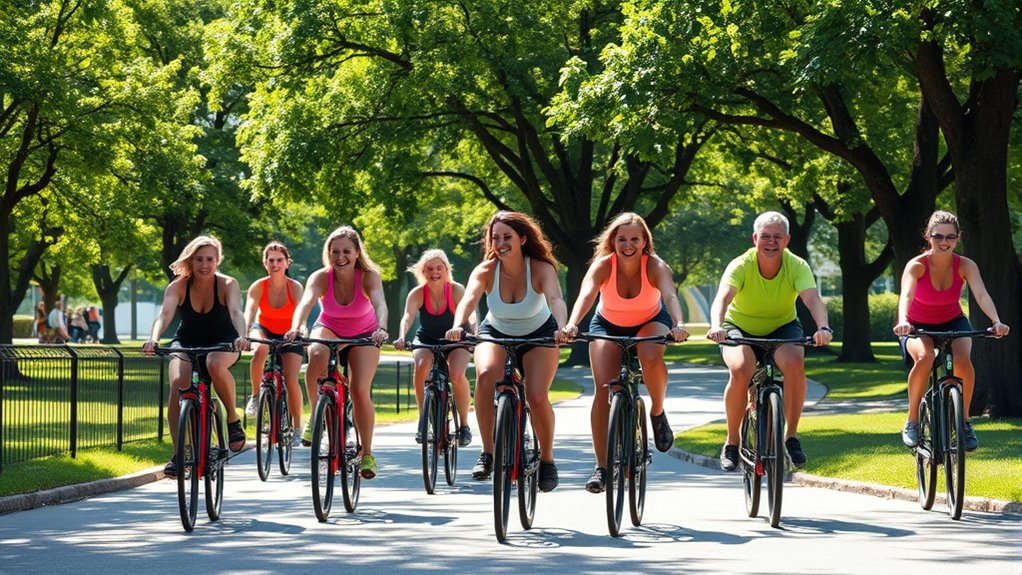A weight-neutral approach to fitness on the bike encourages you to focus on how your body feels and what it can do, rather than on losing pounds. Instead of obsessing over the scale, you celebrate improvements in endurance, strength, and overall well-being. Listening to your body’s signals helps create sustainable habits and reduces negative self-talk. By shifting your perspective, you’ll find more joy and connection during each ride—and uncover even more helpful insights if you keep exploring.
Key Takeaways
- Focus on how riding makes you feel and your physical capabilities rather than solely on weight loss.
- Measure progress through endurance, strength, and ride duration to highlight personal growth.
- Listen to your body’s signals, promoting sustainable habits and reducing guilt associated with societal standards.
- Cultivate body appreciation and avoid negative self-talk by celebrating achievements and embracing resilience.
- Use cycling as a form of self-discovery, fostering motivation, enjoyment, and a positive relationship with movement.

Many people assume that fitness goals must be tied to losing weight, but riding your bike offers a powerful way to focus on health without that pressure. Instead of obsessing over the scale, you can shift your attention to how you feel and how you see yourself. Biking provides a chance to improve your physical and mental well-being without the often harmful fixation on body image. It’s easy to get caught up in comparing yourself to others or aiming for a certain number on the scale, but with a weight-neutral approach, you learn to value your body for what it can do, not just how it looks.
Focus on how you feel and what your body can do, not just the scale.
When you ride with this mindset, performance metrics become more meaningful. Instead of solely tracking weight loss, you measure improvements in endurance, strength, or how long you can ride without fatigue. These metrics are tangible indicators of progress that celebrate your body’s capabilities and resilience. You might notice that your legs feel stronger, your cardiovascular health improves, or that you can ride longer distances with less effort. These achievements reinforce a positive body image, helping you appreciate your body beyond superficial standards. Additionally, focusing on mindful movement during your rides can enhance the overall benefits and deepen your connection with your body.
Adopting a weight-neutral perspective encourages you to listen to your body’s signals rather than punish it for not meeting societal ideals. For instance, if you feel tired or sore, you recognize those as signs to rest or modify your ride, instead of feeling guilty or ashamed. This approach fosters a healthier, more sustainable relationship with exercise, where your focus is on consistency, enjoyment, and personal growth. It’s about celebrating small victories—such as conquering a tough hill or completing a longer ride—rather than fixating on changing your appearance.
Riding your bike with this mindset also reduces the cycle of negative self-talk and comparison. You learn to appreciate your body’s unique strengths and limitations, which can boost your confidence and overall body image. Cycling becomes a way to connect with yourself, enjoy the outdoors, and experience a sense of accomplishment, all without the pressure to conform to external standards. As you focus on performance metrics that matter to you, you’ll find that motivation and joy come more naturally.
Ultimately, a weight-neutral approach transforms cycling from a means to an end—like weight loss—into an empowering journey of self-discovery and health. It’s about embracing movement for its own sake, celebrating what your body can achieve today, and fostering a positive relationship with fitness that lasts a lifetime.
Frequently Asked Questions
How Can I Stay Motivated Without Focusing on Weight Loss?
You can stay motivated by focusing on body positivity and celebrating what your body can do, rather than weight loss. Practice self-compassion, recognizing your progress and strengths. Set goals like improving endurance or enjoying rides more, instead of losing pounds. Remember, your worth isn’t tied to a number. Embrace the journey, stay consistent, and appreciate your body’s capabilities, which keeps you inspired without stressing about weight.
What Are the Mental Health Benefits of Weight-Neutral Cycling?
Remember, beauty is in the eye of the beholder. Cycling can boost your mental health by improving body image and self-esteem without focusing on weight. As you ride, you’ll notice increased confidence, reduced stress, and a sense of accomplishment. This weight-neutral approach helps you enjoy your bike for what it offers—joy, movement, and connection—fostering mental well-being beyond numbers on a scale.
How Do I Measure Progress Without Scale-Based Metrics?
You can measure progress through performance tracking and setting fitness milestones instead of relying on the scale. Focus on how much distance you cover, how your endurance improves, or how your strength increases during rides. Celebrate small victories, like climbing a hill more easily or riding longer without fatigue. These indicators help you see progress, boost motivation, and maintain a positive mindset without fixating on weight.
Can Weight-Neutral Fitness Improve Athletic Performance?
Think of your body as a finely tuned engine; weight-neutral fitness can indeed boost your performance. By focusing on body composition and strength gains rather than weight, you build resilience and power, translating to better cycling results. This approach enhances endurance and muscle efficiency, making you faster and stronger. So, yes, embracing weight-neutral fitness helps you reach new heights without fixating on numbers, just progress and performance.
What Should I Prioritize in a Weight-Neutral Cycling Routine?
You should prioritize body positivity and focus on performance metrics that matter most to you. Emphasize consistent, enjoyable cycling sessions rather than weight loss goals. Track progress through improvements like endurance, speed, or power output, which boost confidence and motivation. Celebrate small victories, avoid self-criticism, and remember that a weight-neutral routine fosters a healthier relationship with fitness, helping you become a stronger cyclist without stressing about weight.
Conclusion
Remember, your bike is more than just a machine — it’s a vessel for your journey, a gentle compass guiding you toward strength and balance. Embrace a weight-neutral approach, letting your progress unfold like a sunrise, slow and steady. Focus on how you feel, not the numbers on a scale. With each pedal stroke, you’re crafting a story of resilience and self-love, transforming your ride into a dance with your best self, one turn at a time.









